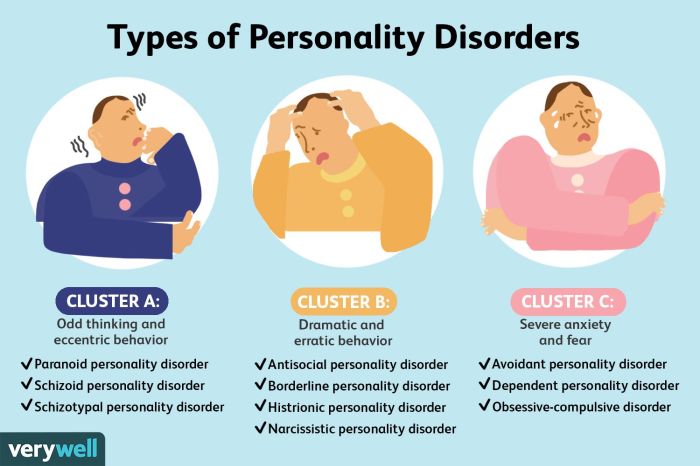Fictional characters with narcissistic personality disorder (NPD) offer captivating insights into the complexities of human nature. These characters, often driven by an insatiable need for admiration and a grandiose sense of self-importance, provide a rich canvas for exploring the motivations, behaviors, and impact of NPD on both character development and the narrative as a whole.
Through the lens of textual, psychological, and comparative analysis, this exploration delves into the diagnostic criteria for NPD, examining how these traits manifest in fictional characters. It uncovers the cultural and societal implications of portraying NPD in fiction, highlighting how these portrayals shape perceptions of mental health.
Introduction

Fictional characters with narcissistic personality disorder (NPD) are fascinating and complex creations that can provide insights into the nature of this disorder. NPD is a mental health condition characterized by an inflated sense of self-importance, a need for admiration, and a lack of empathy for others.
By analyzing fictional characters with NPD, we can gain a better understanding of the disorder and its impact on individuals and society.
Examples of Fictional Characters with NPD
| Character | Book/Movie/Show | Author/Director | Brief Description of NPD Traits |
|---|---|---|---|
| Jay Gatsby | The Great Gatsby | F. Scott Fitzgerald | Grandiose, charming, and manipulative; lacks empathy for others |
| Walter White | Breaking Bad | Vince Gilligan | Arrogant, self-absorbed, and ruthless; believes he is superior to others |
| Regina George | Mean Girls | Mark Waters | Popular, manipulative, and envious; needs constant admiration |
| Severus Snape | Harry Potter series | J.K. Rowling | Aloof, sarcastic, and resentful; has a deep-seated sense of entitlement |
| Cersei Lannister | Game of Thrones | George R.R. Martin | Ambitious, ruthless, and manipulative; believes she is above the law |
Methods of Analysis: Fictional Characters With Narcissistic Personality Disorder
There are several methods for analyzing fictional characters, including:
- Textual analysis:Examining the character’s words, actions, and interactions within the text to identify traits and behaviors consistent with NPD.
- Psychological analysis:Using psychological theories and concepts to interpret the character’s motivations, defenses, and relationships.
- Comparative analysis:Comparing the character to other fictional or real-life individuals with NPD to identify commonalities and differences.
Diagnostic Criteria for NPD
According to the Diagnostic and Statistical Manual of Mental Disorders, Fifth Edition (DSM-5), NPD is diagnosed when an individual meets at least five of the following criteria:
- Has a grandiose sense of self-importance
- Is preoccupied with fantasies of unlimited success, power, brilliance, beauty, or ideal love
- Believes that they are “special” and unique and can only be understood by, or should associate with, other special or high-status people
- Requires excessive admiration
- Has a sense of entitlement
- Is interpersonally exploitative
- Lacks empathy
- Is often envious of others or believes that others are envious of them
- Shows arrogant, haughty behaviors or attitudes
Motivations and Behaviors of Characters with NPD

Fictional characters with NPD are often motivated by a need for admiration, recognition, and power. They may engage in grandiose behaviors, such as boasting about their accomplishments or exaggerating their importance. They may also be manipulative and exploitative, using others to achieve their own goals.
Additionally, they often lack empathy and have difficulty understanding the needs and feelings of others.
Impact on Character Development and Plot
NPD can significantly impact the development and growth of fictional characters. Characters with NPD may struggle to form meaningful relationships and may become isolated and lonely. They may also make poor decisions that have negative consequences for themselves and others.
Additionally, NPD can create conflict and tension within the plot, as the character’s behavior can alienate others and lead to confrontations.
Cultural and Societal Implications

The portrayal of characters with NPD in fiction can have cultural and societal implications. It can help to raise awareness of the disorder and reduce stigma. However, it can also perpetuate stereotypes and misconceptions about NPD. It is important to portray characters with NPD in a nuanced and realistic way that accurately reflects the complexity of the disorder.
FAQ Resource
What is the significance of analyzing fictional characters with NPD?
Analyzing fictional characters with NPD provides a unique opportunity to study the complexities of the disorder in a controlled and accessible setting, offering insights into its manifestations, motivations, and impact.
How does NPD influence character development and plot?
NPD can profoundly affect character development by shaping motivations, behaviors, and relationships. It can also drive plot by creating conflicts, obstacles, and opportunities for growth.
What are the ethical considerations in portraying NPD in fiction?
Portraying NPD in fiction requires sensitivity and accuracy to avoid perpetuating stereotypes or stigmatizing individuals with the disorder. It is essential to balance the entertainment value with responsible representation.